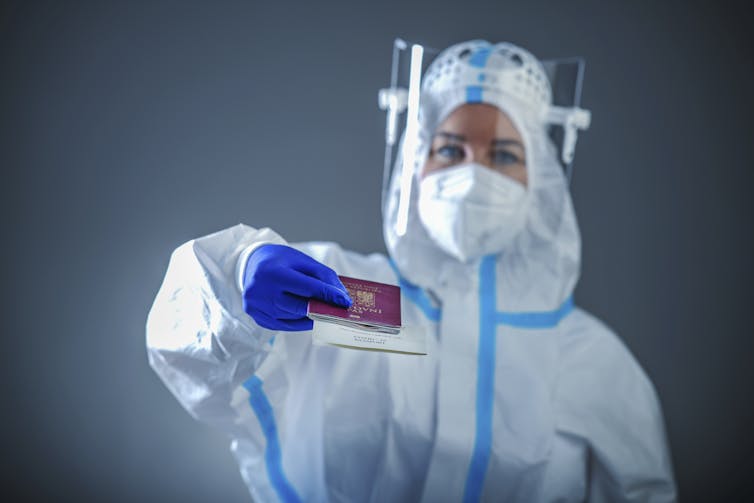If you don't have a COVID vaccination certificate, could you be banned from restaurants, shops and theatres?
- Written by Maria O'Sullivan, Senior Lecturer, Faculty of Law, and Deputy Director, Castan Centre for Human Rights Law, Monash University
Vaccine passports are an increasingly likely proposition in Australia. Last week, national cabinet “welcomed[1]” a new COVID-19 digital vaccination certificate, which will be made available through the Medicare app or myGov.
This week, government services minister Linda Reynolds confirmed[2] Australians who have had two doses would be able to access a certificate. Australians are already able to see their immunisation history online. But the new certificate will only show COVID vaccination status, so it could easily be turned into a “passport”.
Countries all over the world are currently developing digital vaccination passports[3] to facilitate international travel.
In Australia, we are also discussing whether they can be used to open up interstate movement[4] (which will depend on the agreement of state and territory authorities).
However, there is also a legal question as to whether these vaccination certificates can be used for other purposes.
Could businesses ask to see the passport to prevent unvaccinated people from entering restaurants, shops, theatres and other venues? If so, what issues would this raise?
What are vaccine passports?
Vaccine passports are certificates that show the holder has been immunised against COVID-19. Currently they are being developed primarily for travel. For instance, the European Union is set to make available its COVID vaccination passport[5] for all EU citizens and residents by July 1.
 EU residents will get vaccination passports next month.
Vojtech Vlk/AP
EU residents will get vaccination passports next month.
Vojtech Vlk/AP
The certificate is designed to allow freedom of movement within the EU by allowing holders to avoid internal travel restrictions, such as entry bans and quarantine obligations.
Every certificate will contain a unique QR code which will allow verification of its authenticity, the digital signature and the vaccination details (the name of the vaccine and manufacturer, number of doses administered and the date(s) of vaccination).
A passport to dine out?
In addition to travel, other countries have taken a further step and started using vaccination certificates for internal purposes, such as entry into restaurants and events.
For instance, Israel started a “green pass[6]” system earlier this year, which allowed vaccinated people access to theatres, concert halls, indoor restaurants and bars.
People would show the “green pass” on an app to gain entry to places. The app could also display proof someone had recovered from COVID-19.
With most adults in Israel now vaccinated[7], the government retired the pass[8] last week.
But before this, the pass raised privacy concerns. For instance, Orr Dunkelman, a Privacy Israel board member, argued[9] the certificate revealed information that was not necessary for others to know, such as the date a person recovered from COVID or received the vaccine.
Legal considerations for Australia
The first legal point to note is that vaccinations (and certifications of vaccine status) are seen as facilitating the right to health. Widespread vaccination and the use of vaccination passports are viewed as necessary to protect the community from COVID.
Related to this is the argument that vaccination passports will permit greater freedom of movement — which is a recognised human right.
Read more: A COVID 'vaccine passport' may further disadvantage refugees and asylum seekers[10]
However, there are two main legal concerns with using a COVID certificate to regulate entry into events, restaurants and other businesses.
First, both governments and corporations need to abide by anti-discrimination laws. There will be a relatively small group of people who are unable to have the vaccination for medical reasons. A business that excludes such a person could risk breaching these laws.
The government must therefore consider how to reflect valid exemptions in the COVID certificate. One way to deal with some of the discrimination concerns would be to give unvaccinated individuals with a medical exemption an “unvaccinated with exemption”-type certificate.
What if you don’t want to get vaccinated?
The more difficult question is whether this would be lawful for those who simply do not want to get the vaccination. As I have argued previously[11], there is no recognised right to conscientious objection to vaccinations under Australian law. Therefore, it may be lawful for businesses to refuse entry to such persons who do not have a COVID certificate.
More generally, however, it would not be lawful for businesses selling essential goods (such as Coles and Woolworths) to refuse entry to unvaccinated persons (whether or not they have a valid exemption). This is due to the fact this would deny persons access to basic food items.
Privacy and equity issues
The use of a digital certificate or app also raises privacy issues. This system will create a significant new store of data of potentially sensitive personal information. This is of particular concern if it is linked to other information on the myGov plaftorm or contains additional data to that of vaccination status.
Finally, government and businesses need to be aware of the equity issues surrounding both the vaccine rollout and any associated certification scheme. In my opinion, enforcement of vaccination passports could not occur before everyone in Australia has been given the opportunity to have the COVID vaccination.
References
- ^ welcomed (theconversation.com)
- ^ confirmed (minister.servicesaustralia.gov.au)
- ^ digital vaccination passports (www.schengenvisainfo.com)
- ^ open up interstate movement (www.9news.com.au)
- ^ COVID vaccination passport (www.schengenvisainfo.com)
- ^ green pass (www.technologyreview.com)
- ^ now vaccinated (www.businessinsider.com.au)
- ^ retired the pass (www.reuters.com)
- ^ argued (www.technologyreview.com)
- ^ A COVID 'vaccine passport' may further disadvantage refugees and asylum seekers (theconversation.com)
- ^ previously (theconversation.com)

















